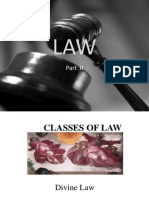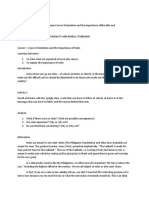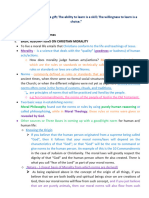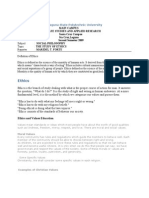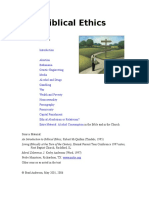10.2.2 How Can People Know If Their Choices Are Morally Good
10.2.2 How Can People Know If Their Choices Are Morally Good
Uploaded by
sherylmatchado07Copyright:
Available Formats
10.2.2 How Can People Know If Their Choices Are Morally Good
10.2.2 How Can People Know If Their Choices Are Morally Good
Uploaded by
sherylmatchado07Original Title
Copyright
Available Formats
Share this document
Did you find this document useful?
Is this content inappropriate?
Copyright:
Available Formats
10.2.2 How Can People Know If Their Choices Are Morally Good
10.2.2 How Can People Know If Their Choices Are Morally Good
Uploaded by
sherylmatchado07Copyright:
Available Formats
HOW CAN PEOPLE
10.2.2
KNOW IF THEIR CHOICES
ARE MORALLY GOOD?
This chapter presents the following key learning points:
• People need to learn moral principles
• Natural law expresses the moral principles God
gave to people
• The revealed laws of God consist primarily of the
Ten Commandments and the two great commandments
of Jesus.
People need to learn moral principles
While people might want what will lead to long term happiness for themselves and others,
they can make mistakes. What can seem a good choice at the time can turn out to be a
mistake, often leading to hurt instead of happiness.
Moral choices are about right and wrong. To work out right and wrong, people need to learn
moral principles. They then need to learn to apply these moral principles to the decisions they
are going to make.
Moral principles teach right and wrong
Moral principles are used for evaluating whether a thought, word or action is right or wrong.
Many, but not all moral principles have been discovered by the human race over thousands of
years. There are important moral principles that people have not discovered on their own but
which have been revealed by God.
When people obey moral principles,
they do what is right. When they
disobey these principles, they do
what is wrong.
YEAR 10 | COME FOLLOW ME 1
God established all moral principles
God established all moral principles by creating human nature in God’s own image and
likeness.
Original sin damaged human nature in many ways. One way was to make it difficult for people
to recognise all the moral principles God gave.
As a result, people can see the most obvious principles but became confused about less
obvious ones. People make mistakes about right and wrong and are unsure about how the
moral principles they recognise apply to decisions they have to make in daily life.
People also become confused by emotions and other influences. Sometimes what is morally
wrong, ‘feels right’.
To rediscover the moral principles that are part of human nature it is necessary to recall that
human nature was originally created by God.
When creating human nature:
‘... in our own image, in the likeness of ourselves ...’ (Genesis 1:26)
God was establishing the first of all moral principles – that human beings should always
behave in God-like ways.
All other moral principles are based upon this principle. For example, it is because they are
created to reflect God, a Trinity of persons existing in perfect love, unity and goodness that
human beings should always strive to:
• relate closely to God, for God always wants to relate more closely to them
• behave in loving ways, because God behaves only in loving ways
• do good, because God does only what is good
• care for themselves properly, for God always cares about them
• avoid doing wrong, because God never does wrong
• treat every human being with respect, because God loves all human beings equally,
regardless of race, ability, age or any other consideration
• be just always, because God is always just
• be merciful and forgiving, because God is merciful and forgiving
• treat human life as sacred, because God created life as sacred
• respect the goodness of creation, because God sees all of creation as good (Genesis 1:31).
Every human being is obliged to live by these principles. Behind them is the authority of
the Creator. To live by these principles leads to a genuinely happy life and brings long-term
happiness to oneself as well as to others.
These principles are not clear to everyone because of original sin. They are made clear by God’s
moral commandments and laws. The most important are the Ten Commandments and the
commandments of Jesus.
2 YEAR 10 | COME FOLLOW ME
Natural law expresses the moral principles God gave to people
God created human beings with the ability to reason. Humans are able to use their ordinary
intelligence to determine what is right and what is wrong according to the moral principles
God wants them to obey. The moral law that follows from the understanding of these
principles by human reason is called ‘natural law’ because reason is part of human nature.
For your information...
The term ‘natural law’ does not refer to laws of nature such as the law of gravity. ‘Natural
law’ refers to laws natural to people, that is, laws in harmony with the nature of every
human being. These are laws that a person with God-given reason can perceive will
bring true happiness.
For example, from the moral principle that human life must be respected as sacred, people
can discover moral laws such as it is wrong to murder another human being, be they born or
unborn, and that the poor and the needy must be provided with the necessities of life.
Likewise, from the moral principle that every human person should be treated fairly, people
can discover such moral laws as that racism is wrong, as is every form of prejudice and unfair
treatment of others.
As people use their reason to discover how to behave as individuals created in God’s own
image and likeness, they discover natural law.
Natural law applies to all people
God intends all people to behave in God-like ways. This is why people of all religions and
cultures tend to value love, goodness, justice and the other moral principles identified above.
YEAR 10 | COME FOLLOW ME 3
Natural law can never change
Natural law is found within human nature as created by God. Therefore, as human nature can
never change, so natural law can never change.
Social trends may lead people to ignore different aspects of natural law, but this can eventually
lead to social divisions and unhappiness. No institution in society, be it a parliament or even the
Church, has the authority to change or to permit people to disobey natural law.
There are many examples of social institutions claiming the right to permit people to do what
God has revealed to be wrong.
Examples of laws made by parliaments in different countries that have violated God’s laws
include statutes permitting:
• abortion
• racial or religious segregation
• slavery
• the separation of Aboriginal children from their families
• capital punishment.
As the creator of the human race God’s authority is always greater than any human authority.
This is because every human society is made up of individuals, each of whom depends upon
God for their every breath and movement.
In Class Work
Natural law is knowable to humans through the power of reason. For instance, it is
natural for each person to desire to preserve their own life. To destroy one’s own life
or the life of anyone else would be in direct contradiction to this natural instinct. It
follows that no one has the right to do anything that would destroy a human life,
that is, human life is sacred.
Discuss the proposition, ‘Capital punishment is against natural law.’
...every human society is made up of
individuals, each of whom depends
upon God for their every breath
and movement.
YEAR 10 | COME FOLLOW ME
Moral relativism
In a democracy, every person
of voting age has a say in
electing the government. The
elected government makes
the decisions that affect the
whole nation. One of the
misconceptions that may arise
from the democratic process is
that every person’s opinion is of
equal value. To hold that what is
right or wrong depends entirely
on an individual’s point of view is
called ‘moral relativism’.
Moral relativism ignores absolute
ethical standards and maintains
that moral principles can
change according to culture,
circumstances or personal
choice. Moral relativism is contrary to the fact that there are universal principles of natural law
that govern what is right and wrong.
Freedom of choice cannot impose decisions which are against natural law. A demand for
individual freedom does not make right or excuse morally wrong decisions made by the
majority. The common good is not served by changing fashions and opinions.
The history of the twentieth century demonstrates the dangers of moral relativism, one
example is the persecution of Jews in Nazi Germany. Another example was seen in the case of
apartheid in South Africa where whites were treated more preferentially than blacks. In both
cases universal principles of natural law were ignored and the fates of many depended instead
on the opinions of certain powerful people.
In Class Work
Discuss and list decisions made by groups or countries that have been popular
but morally wrong.
YEAR 10 | COME FOLLOW ME 5
The revealed laws of God
consist primarily of the
Ten Commandments
and the two great ‘You must love the Lord
commandments of Jesus your God with all your
heart, with all your soul,
Because natural law is not always easy for
and with all your mind.
people to see, God revealed other laws to
help them live in ways that lead to true
...You must love your
happiness. The most important of these are
neighbour as yourself.’
called the Ten Commandments or Decalogue.
They teach people how to live in ways consistent
with human nature as God originally created it. Jesus
taught people how to understand the Ten Commandments
or Decalogue. He taught two great commandments,
selected from Old Testament summaries of the Law, which
enable all who obey them to live the Decalogue:
‘You must love the Lord your God with all your heart, with all your soul, and with all your
mind. This is the greatest and first commandment. The second resembles it: You must
love your neighbour as yourself.’ (Matthew 22:37-39 cf Deuteronomy 6:5 and Leviticus 19:18)
The first great commandment helps people to understand the first, second and third
commandments of the Decalogue. The second great commandment helps people to
understand the other seven commandments.
For your information...
Jesus took a proverb well known in the ancient world, ‘Do to no one what you would not want
done to you.’ (Tobit 4:15) and restated it in a positive form as an important moral principle;
‘... always treat others as you would like them to treat you ...’ (Matthew 7:12)
This is known as ‘The Golden Rule.’
Journal Activity
Reflect on the two great commandments taught by Jesus (Matthew 22:37-39). What
do these mean for you at this stage in your life? How do they apply to you? How can
you love God better? Who is the ‘neighbour’ you need to love?
6 YEAR 10 | COME FOLLOW ME
In Class Work
Use the information in Chapters 1 and 2 to select the best answer for each
of the following.
1. In order to make a responsible decision two things are necessary:
a) principle and practice
b) nature and reason
c) knowledge and freedom
d) image and likeness
2. A moral choice contributes to long term happiness because it is directed towards:
a) true goodness
b) obeying the law
c) what feels right
d) avoiding pain
3. Moral principles teach:
a) ancient wisdom
b) right and wrong
c) discipline and confidence
d) fables and myths
4. Humans are created in God’s image, nevertheless, moral principles can be:
a) confused by original sin
b) damaged by human nature
c) impossible to know
d) naturally obvious to all
5. Natural law expresses the moral principles God inscribed:
a) in the laws of nature
b) in stone on Mt Sinai
c) in human nature
d) in natural justice
6. Natural law can be discovered by using:
a) physical science
b) legal enquiry
c) Bible study
d) human reason
7. Natural law is absolute. This means natural law:
a) is a fundamental standard
b) can never change
c) applies to everyone
d) all of the above
YEAR 10 | COME FOLLOW ME 7
8. Changing moral principles according to fashions, fads or feelings is called:
a) moral democracy
b) moral relativism
c) moral tolerance
d) moral freedom
9. ‘Decalogue’ is another name for:
a) the first five books of the Bible
b) The Ten Commandments
c) the two Great Commandments
d) a morally decadent person
10. Jesus taught that Divine Law is based on love of God and:
a) love of yourself
b) love with all your heart
c) love of your friends
d) love of your neighbour
8 YEAR 10 | COME FOLLOW ME
You might also like
- War ScrollDocument3 pagesWar Scrollcaptmichaelpierce50% (2)
- A Summary of John FinnisDocument6 pagesA Summary of John FinniskitakatttNo ratings yet
- Ancient To Midevil Church HistoryDocument2 pagesAncient To Midevil Church HistoryLisa BakerNo ratings yet
- The False Gods We Worship - Spencer W. KimballDocument6 pagesThe False Gods We Worship - Spencer W. KimballSyncOrSwim100% (2)
- 10.3a.2 Making Judgements of ConscienceDocument9 pages10.3a.2 Making Judgements of Consciencesherylmatchado07No ratings yet
- THEO 3 Module 4 & 5Document4 pagesTHEO 3 Module 4 & 5ninreyNo ratings yet
- Explain A Natural Law Approach To Moral Decision MakingDocument2 pagesExplain A Natural Law Approach To Moral Decision Makingben12wright12367% (3)
- Persuasiveness of Natural LawDocument19 pagesPersuasiveness of Natural LawnimusiimamirianNo ratings yet
- Gec09 PPT3Document69 pagesGec09 PPT3Abigail CaagbayNo ratings yet
- Moral Ethical TheoriesDocument22 pagesMoral Ethical TheoriesFamily Planning DOH 12No ratings yet
- Chapter 3 - Natural Law TheoryDocument26 pagesChapter 3 - Natural Law TheoryMa. Christina BangngayNo ratings yet
- Lesson 7 Natural Law EthicsDocument25 pagesLesson 7 Natural Law Ethicslaurencemartin09No ratings yet
- Module IiDocument16 pagesModule IiDickson Tk Chuma Jr.No ratings yet
- Aquinas Theory of Natural Law Teachers NotesDocument5 pagesAquinas Theory of Natural Law Teachers Notesjoeeyy mNo ratings yet
- Lesson 1 ContDocument51 pagesLesson 1 ContLois BriosoNo ratings yet
- Divine Command EthicsDocument10 pagesDivine Command EthicsSchool BackupNo ratings yet
- Lesson 8 Norms of Morality 2Document6 pagesLesson 8 Norms of Morality 2Jannica Delos ReyesNo ratings yet
- Ethical Issues in Medical ProfessionDocument13 pagesEthical Issues in Medical ProfessionDondi MenesesNo ratings yet
- PM2 Lesson 1 Discussion: DecalogueDocument32 pagesPM2 Lesson 1 Discussion: DecalogueSanyln AclaNo ratings yet
- 9 Norms of MoralityDocument34 pages9 Norms of MoralityDavide LeeNo ratings yet
- Deontological EthicsDocument4 pagesDeontological Ethicschsm798zrpNo ratings yet
- St. Thomas' Natural Law Ethics_20241203_231026_0000Document20 pagesSt. Thomas' Natural Law Ethics_20241203_231026_0000payadyadchristena06No ratings yet
- Requiremen TIN Christian Morality: Reflection (Short Cut) Summary of LawDocument5 pagesRequiremen TIN Christian Morality: Reflection (Short Cut) Summary of LawCASPERNo ratings yet
- ETHICS Quizzes - CompilationDocument13 pagesETHICS Quizzes - CompilationmamalapatalfNo ratings yet
- Natural Law EssayDocument2 pagesNatural Law EssayCharlotte BurkeNo ratings yet
- NORMS OF MORALI-WPS OfficeDocument4 pagesNORMS OF MORALI-WPS OfficeRamisarez IrishNo ratings yet
- Law Part 2Document16 pagesLaw Part 2Minerva Agrito LautrizoNo ratings yet
- Health Ethics Lessosn 2Document13 pagesHealth Ethics Lessosn 2madznaNo ratings yet
- Religious SubjectDocument15 pagesReligious SubjectJG ElbaNo ratings yet
- Sp. Eng - Day 3Document5 pagesSp. Eng - Day 3Ache NegomboNo ratings yet
- 84po19rw T.afe!6qlDocument11 pages84po19rw T.afe!6qlGloria AsuncionNo ratings yet
- Ethics NotesDocument5 pagesEthics Notesmain.22000407No ratings yet
- Lesson 2Document4 pagesLesson 2Lorenz AlvaradoNo ratings yet
- Theology 4 DiscussionDocument17 pagesTheology 4 Discussionkurtbusbus1No ratings yet
- What Is Right?: Biblical Principles For Decision-MakingDocument34 pagesWhat Is Right?: Biblical Principles For Decision-MakingRaja Ahmad AzhamNo ratings yet
- CH 3 Theories of EthicsDocument42 pagesCH 3 Theories of EthicsYash HoraNo ratings yet
- Cfed 1023 Reviewer ACTDocument5 pagesCfed 1023 Reviewer ACTmcmendezabalNo ratings yet
- A Word of Love Gives Inspiration To Life, A Word of Care Gives Happiness To The Heart, A Word of God Gives Direction To Our Life.-Airene TDocument4 pagesA Word of Love Gives Inspiration To Life, A Word of Care Gives Happiness To The Heart, A Word of God Gives Direction To Our Life.-Airene TRubz Jean100% (1)
- Law and Standard of MoralityDocument7 pagesLaw and Standard of MoralityMaximillianNo ratings yet
- Explain The Theory of Natural LawDocument2 pagesExplain The Theory of Natural LawJamie HallNo ratings yet
- Ilovepdf MergedDocument91 pagesIlovepdf MergedDenzel Luna QuiambaoNo ratings yet
- Chapter 1 Understanding Morality Moral StandardsDocument17 pagesChapter 1 Understanding Morality Moral StandardsPearl agnes JavonilloNo ratings yet
- Ge006 Midterm Lesson 3.2Document17 pagesGe006 Midterm Lesson 3.2Ramil BillonesNo ratings yet
- Lesson 2 Why EthicsDocument51 pagesLesson 2 Why Ethicsmjpareja1946No ratings yet
- Lesson 3. The Proximate Standard and Other StandardsDocument10 pagesLesson 3. The Proximate Standard and Other StandardsGuki SuzukiNo ratings yet
- Lesson 2 3 Introduction To Morality Meaning and PresuppositionsDocument7 pagesLesson 2 3 Introduction To Morality Meaning and PresuppositionsMeah Angela GulacNo ratings yet
- Quiz #1Document2 pagesQuiz #1daniela mae TagNo ratings yet
- Why Study Ethics in PhilosophyDocument12 pagesWhy Study Ethics in PhilosophyLiah Lyona IkutaNo ratings yet
- Answer:: Learning ActivityDocument1 pageAnswer:: Learning ActivityENTICE PIERTONo ratings yet
- PHILO1 - GAGUAN - Final Major Performance TaskDocument2 pagesPHILO1 - GAGUAN - Final Major Performance TaskHirrah GaguanNo ratings yet
- The Morality of Happiness and Morality of ObligationDocument3 pagesThe Morality of Happiness and Morality of ObligationMelanie LemusNo ratings yet
- Cardinal Virtues - Youth Doctrine ClassDocument51 pagesCardinal Virtues - Youth Doctrine ClassSheryl CoronelNo ratings yet
- Natural-Law-and-Divine-Command-Theory.pptx_20241207_090514_0000Document30 pagesNatural-Law-and-Divine-Command-Theory.pptx_20241207_090514_0000Stephen Ally BarramedaNo ratings yet
- GROUP 4 Chapter 1 Good Governance and CSRDocument29 pagesGROUP 4 Chapter 1 Good Governance and CSRRieck Jhon CamsonNo ratings yet
- Fundamentals of EthicsDocument9 pagesFundamentals of EthicsMary ChristelleNo ratings yet
- Diff Between Religion and DeenDocument7 pagesDiff Between Religion and Deenhunaiza khanNo ratings yet
- ETHICSDocument18 pagesETHICSMichelle MunozNo ratings yet
- Prayer To St. AugustineDocument78 pagesPrayer To St. AugustineEllah Mae100% (1)
- Biblical EthicsDocument105 pagesBiblical EthicsDavid John MorandarteNo ratings yet
- 1722 PDFDocument47 pages1722 PDFbrylle lego100% (1)
- Three Moral Bases That Will Help One Uphold An Ethical PrincipleDocument3 pagesThree Moral Bases That Will Help One Uphold An Ethical PrincipleGohan Dave AgmataNo ratings yet
- Morality ReportDocument62 pagesMorality ReportMenard AnocheNo ratings yet
- 10.1.5 Ministerial Priesthood Is A VocationDocument16 pages10.1.5 Ministerial Priesthood Is A Vocationsherylmatchado07No ratings yet
- Food SafetyDocument12 pagesFood Safetysherylmatchado07No ratings yet
- 10.1.3 The Christian VocationDocument19 pages10.1.3 The Christian Vocationsherylmatchado07No ratings yet
- 10.2.3 God Begins To Restore Human FreedomDocument7 pages10.2.3 God Begins To Restore Human Freedomsherylmatchado07No ratings yet
- 10 HUA Civics Part ADocument11 pages10 HUA Civics Part Asherylmatchado07No ratings yet
- 2015 HSF AnswersDocument10 pages2015 HSF Answerssherylmatchado07No ratings yet
- 6 Principles of Jesus CommunicationDocument24 pages6 Principles of Jesus CommunicationFritzieNo ratings yet
- Baptism W H.G. 1Document6 pagesBaptism W H.G. 1Nana Kwame GyebiNo ratings yet
- Philip K Dick - How To Build A Universe That Doesn't Fall Apart Two Days LaterDocument14 pagesPhilip K Dick - How To Build A Universe That Doesn't Fall Apart Two Days LaterDan Werbin100% (2)
- 1 Spiritual Warfare Chris ChildDocument76 pages1 Spiritual Warfare Chris ChildDeepa DuttNo ratings yet
- Exposing Jezebels Web of LiesDocument56 pagesExposing Jezebels Web of LiesDaniel Wiebrands100% (1)
- America in ProphecyDocument54 pagesAmerica in ProphecyLavender BlueNo ratings yet
- Mary and The Bible - Purgatory and The BibleDocument7 pagesMary and The Bible - Purgatory and The Bibleapi-3732481No ratings yet
- Happy PrinceDocument2 pagesHappy Princepritam duttaNo ratings yet
- 圣经故事 - 团队合作Document8 pages圣经故事 - 团队合作freekidstoriesNo ratings yet
- 1 Samuel 15Document9 pages1 Samuel 15hansriNo ratings yet
- 2023 CatalogDocument96 pages2023 CatalogSaint Margaret Catholic ChurchNo ratings yet
- Exodus 4 414Document169 pagesExodus 4 414karunasamNo ratings yet
- TriodionDocument721 pagesTriodionvoxstefani100% (1)
- The Two Kingdoms PDFDocument157 pagesThe Two Kingdoms PDFRD LumacangNo ratings yet
- Early English BestiaryDocument49 pagesEarly English BestiaryMr. PaikNo ratings yet
- NOW U R CHILD OF GOD - EnglishDocument24 pagesNOW U R CHILD OF GOD - EnglishVijayNo ratings yet
- Rebuttal ToDocument67 pagesRebuttal ToJan StolecNo ratings yet
- Childrens Sermon What Is Compassion Mark 6Document4 pagesChildrens Sermon What Is Compassion Mark 6John Duro AlidonNo ratings yet
- Reed Module 2Document3 pagesReed Module 2Micha Jade BaldozNo ratings yet
- Manuscript, Lighting of Advent Candles_a4a5005b d035 47da Ad1f 9a1e2e3c02a2Document5 pagesManuscript, Lighting of Advent Candles_a4a5005b d035 47da Ad1f 9a1e2e3c02a2fabec2022No ratings yet
- Contact Magazine (Fall 2017) : Racial ReconciliationDocument48 pagesContact Magazine (Fall 2017) : Racial ReconciliationGordon-Conwell Theological Seminary100% (4)
- The Bible-God'S Unique Book!Document18 pagesThe Bible-God'S Unique Book!Angel FranciscoNo ratings yet
- 30 The Scriptures. Old Testament. Hebrew-Greek-English Color Coded Interlinear: Song of SongsDocument40 pages30 The Scriptures. Old Testament. Hebrew-Greek-English Color Coded Interlinear: Song of SongsMichaelNo ratings yet
- Book Review Geisler If God Why EvilDocument3 pagesBook Review Geisler If God Why EvilNickNorelliNo ratings yet
- Pinnacle BW 01Document16 pagesPinnacle BW 01Mainor sanchezNo ratings yet
- Orthodox Christian Page 4 PrayerDocument2 pagesOrthodox Christian Page 4 PrayerElenie100% (2)


























